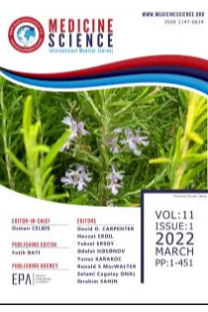The evaluation of general psychiatric symptoms of medical staffs in the Covid-19 pandemic in Turkey
The evaluation of general psychiatric symptoms of medical staffs in the Covid-19 pandemic in Turkey
___
- World Health Organization (WHO) (2020). https://www.who.int/docs/ default-source/coronaviruse/situation-reports/20200512-covid-19- sitrep-113.pdf?sfvrsn=feac3b6d_2, Access date Jan 04, 2021
- Republic of Turkey Ministry of Health (MoH) (2020) https://covid19bilgi. saglik.gov.tr/tr/ access date Jan 04, 2021
- World Health Organization (WHO) (2020). https://www.who.int/docs/ defaultsource/coronaviruse/situation-reports/20200512-covid-19- sitrep-113.pdf?sfvrsn=feac3b6d_2 , access date May 30, 2020
- Bai Y, Lin CC, Lin CY, et al. Survey of stress reactions among health care workers involved with the SARS outbreak. Psychiatr Serv. 2004;55:1055-7.
- Maunder R, Hunter J, Vincent L, et al. The immediate psychological and occupational impact of the 2003 SARS outbreak in a teaching hospital. CMAJ. 2003;168:1245-51.
- Lai J, Ma S, Wang Y, et al. Factors Associated With Mental Health Outcomes Among Health Care Workers Exposed to Coronavirus Disease 2019. JAMA Netw Open. 2020;3:e203976. Published 2020 Mar 2.
- Hacimusalar Y, Kahve AC, Yasar AB, et al. Anxiety and hopelessness levels in COVID-19 pandemic: A comparative study of healthcare professionals and other community sample in Turkey. J Psychiatr Res. 2020;129:181-8.
- Şahin MK, Aker S, Şahin G, et al. Prevalence of Depression, Anxiety, Distress and Insomnia and Related Factors in Healthcare Workers During COVID-19 Pandemic in Turkey. J Community Health. 2020;45:1168-77.
- Sahin NH, Durak Batigün A, Uğurtaş S. Kisa Semptom Envanteri (KSE): ergenler için kullaniminin geçerlik, güvenilirlik ve faktör yapisi [The validity, reliability and factor structure of the Brief Symptom Inventory (BSI)]. Turk Psikiyatri Derg. 2002;13:125-35.
- Geisner IM, Bowen S, Lostutter TW, et al. Gambling-Related Problems as a Mediator Between Treatment and Mental Health with At-Risk College Student Gamblers. J Gambl Stud. 2015;31:1005-13.
- Kurt B, Akbaba M. Psychiatric Health Status and Affecting Factors of Adults in a Rural Area in Çukurova Region. Sakarya Med J. 2018;8:538-50.
- Öner N, LeCompte WA. Discontinuous State / Trait Anxiety Inventory Handbook, 1st ed., Istanbul: Boğaziçi University Publications. p:1-26, 1983
- Wu P, Fang Y, Guan Z, et al. The psychological impact of the SARS epidemic on hospital employees in China: exposure, risk perception, and altruistic acceptance of risk. Can J Psychiatry. 2009;54:302-11.
- Kang L, Li Y, Hu S, et al. The mental health of medical workers in Wuhan, China dealing with the 2019 novel coronavirus. Lancet Psychiatry. 2020;7(3):e14.
- Lai J, Ma S, Wang Y, et al. Factors Associated With Mental Health Outcomes Among Health Care Workers Exposed to Coronavirus Disease 2019. JAMA Netw Open. 2020;3:e203976. Published 2020 Mar 2.
- Li Z, Ge J, Yang M, et al. Vicarious traumatization in the general public, members, and non-members of medical teams aiding in COVID-19 control. Brain Behav Immun. 2020;88:916-9.
- Zhang WR, Wang K, Yin L, et al. Mental Health and Psychosocial Problems of Medical Health Workers during the COVID-19 Epidemic in China. Psychother Psychosom. 2020;89:242-50.
- Tan BYQ, Chew NWS, Lee GKH, et al. Psychological Impact of the COVID-19 Pandemic on Health Care Workers in Singapore. Ann Intern Med. 2020;173:317-20.
- Spoorthy MS, Pratapa SK, Mahant S. Mental health problems faced by healthcare workers due to the COVID-19 pandemic-A review. Asian J Psychiatr. 2020;51:102119.
- Nickell LA, Crighton EJ, Tracy CS, et al. Psychosocial effects of SARS on hospital staff: survey of a large tertiary care institution. CMAJ. 2004;170:793-8.
- Huang JZ, Han MF, Luo TD, et al. Zhonghua Lao Dong Wei Sheng Zhi Ye Bing Za Zhi. 2020;38(3):192-195.
- Sakaoğlu HH, Orbatu D, Emiroglu M, et al. Spielberger State and Trait Anxiety Level in Healthcare Professionals During the Covid-19 Outbreak: A Case of Tepecik Hospital Tepecik Eğit. Ve Araşt. Hast. Dergisi 2020;30:1-9.
- Lee SH, Juang YY, Su YJ, et al. Facing SARS: psychological impacts on SARS team nurses and psychiatric services in a Taiwan general hospital. Gen Hosp Psychiatry. 2005;27:352-8.
- Styra R, Hawryluck L, Robinson S, et al. Impact on health care workers employed in high-risk areas during the Toronto SARS outbreak. J Psychosom Res. 2008;64:177-83.
- Chen Q, Liang M, Li Y, et al. Mental health care for medical staff in China during the COVID-19 outbreak [published correction appears in Lancet Psychiatry. 2020;7:27]. Lancet Psychiatry. 2020;7:15-6.
- ISSN: 2147-0634
- Yayın Aralığı: 4
- Başlangıç: 2012
- Yayıncı: Effect Publishing Agency ( EPA )
Sekazu: an integrated solution tool for gender determination based on machine learning models
Muhammed Kamil TURAN, Eftal ŞEHİRLİ, Zülal ÖNER, Serkan ÖNER
Diagnostic role of complete blood count in pleural effusions
Renad Mammadov, Bulent Dabanlioglu, Taha Abdulkadir Coban, Ismail Salcan, Sumeyye Akyuz, Halis Suleyman, Ertugrul Erhan1, Muhammet Dilber
Emek Guldogan, Zeynep Kucukacali
Ayberk TÜRKYILMAZ, Oğuzhan YARAL, Erdal KURNAZ, Atilla ÇAYIR
Pharmacological treatment of obesity in clinical practice
Ibrahim Sahin, Omercan Topaloglu
Can the perfusion index predict spinal anesthesia-induced hypotension in geriatric patients?
Evaluation of poisoning cases admitted to pediatric emergency department
Semih Basci, Fevzi Altuntas, Mehmet Sinan Dal, Fatma Meric Yilmaz, Mehmet Bakirtas, Nurgul Ozcan, Eda Ozcan, Merih Kizil Cakar
Should enterobiasis be considered during the examination of sexually abused children?
